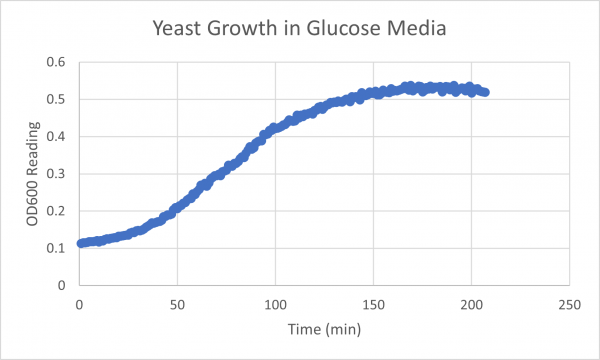UW-Stout/Glycerol FA22
Introduction
In yeast cells, glucose is a preferred carbon source for fermentation in yeast cells. Fermentation produces ethanol and CO2 from glucose. Other carbon sources, like glycerol, are unfermentable which, in the absence of glucose, would use other forms of carbon fixation with alternate products. In this experiment, we will be testing the results of glucose starvation with a replacement of glycerol as a carbon source in a number of knockout strains of yeast.
Materials/Equipment
- 96-well assay plate
- Microplate reader
- Wild-type yeast cells
- 5 yeast knockout strains
- 3% glycerol media (procedure included later in this study)
- Sterile water
- P200 and P1000 micropipette and tips
Safety Note
Always wear appropriate lab PPE when working in the laboratory. A lab coat, goggles, and gloves are necessary to not only protect you, but the science too! For additional protection, always work under a biochemical safety hood.
Protocol
Make a 3% glycerol media solution using appropriate amounts of materials below:
- Yeast nitrogen base
- De-ionized water
- Ammonium sulfate
- Pure glycerol
- Complete supplement mixture
- 100x Histone Solution
- 100x Lysine Solution
- 100x Uracil Solution
Modify the liquid yeast media by replacing the original glucose solution with the glycerol media solution made in step 1. Repeat this for the wild type yeast as well as the 5 knockout strains. Set up the yeast wells, working underneath the biochemical safety hood, including the controls of each knockout strain. Set up the plate reader and run for 18 hours
Wild Type Yeast Data
For our pilot experiment, we had two different samples: wild type yeast grown in 1x glucose media and wild type yeast grown in the 3% glycerol media.
 The OD600 reading of the yeast cells per time every 5 minutes is graphed on a scatterplot. The growth peaks above 0.5. and a doubling time around 231 minutes was calculated.
The OD600 reading of the yeast cells per time every 5 minutes is graphed on a scatterplot. The growth peaks above 0.5. and a doubling time around 231 minutes was calculated.